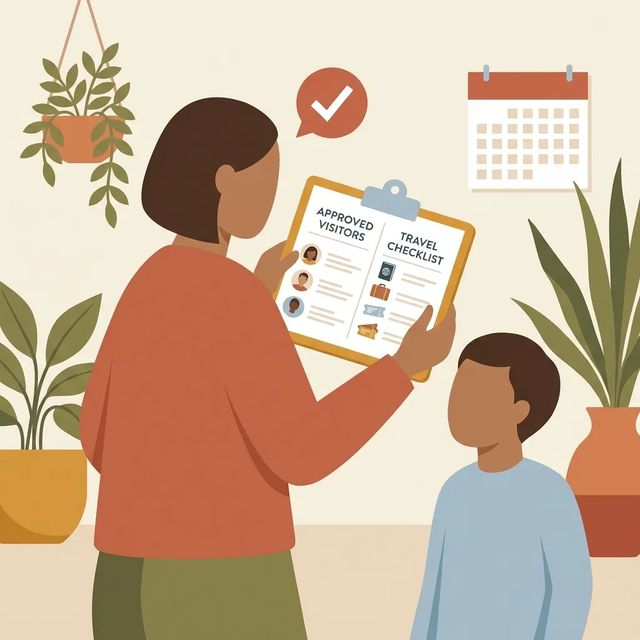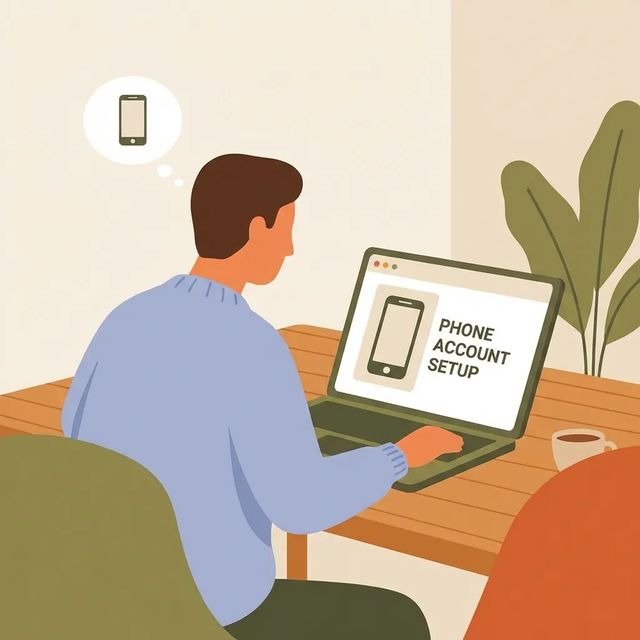Dekalb County Jail
Explore
Find an Inmate at Dekalb County Jail
Search for a loved one and send messages and photos in minutes.

Guides for This Facility

How to Schedule a Visit at DeKalb County Jail (24-Hour Advance Booking)
Scheduling a visit at DeKalb County Jail is straightforward once you know the two big rules: you must be on the inmate's approved list, and you need to book at least 24 hours ahead.
Read Guide
Setting Up Phone Calls from DeKalb County Jail: AdvancePay, PIN Debit, and Support Numbers
Want to receive phone calls from someone at DeKalb County Jail? You'll need to set up the right account with the right service. Here's a clear breakdown of AdvancePay vs. PIN Debit, how GettingOut fits in, and the support numbers listed in DeKalb's materials.
Read Guide
Who to Call When You Have Questions About DeKalb County Jail
Figuring out bond, deposits, messaging, or custody details at DeKalb County Jail? The fastest path is calling the right office—or using the right portal—the first time.
Read GuideAt a Glance
Visitation
- Visitors must be on the inmate’s approved visitation list and are limited to one visit per week.
- All visits must be scheduled at least 24 hours in advance and cannot be booked by telephone.
- On‑site video visits are available daily in two blocks and inmates get two 30‑minute visitation sessions per week at the visitation center.
Communication
- To receive phone calls you must create and fund an AdvancePay account with ConnectNetwork.
- GettingOut/Telmate customer care is available 24/7 at 1‑866‑516‑0115.
- Remote (at‑home) video visits cost $5.00 per 30‑minute session and are arranged through GettingOut.
Mail & Letters
- All personal mail (letters, pictures, drawings) is delivered digitally to inmates via tablet.
- Personal mail must be sent to the vendor P.O. Box in Phoenix, MD — the new DeKalb mailing address.
- Senders must include the facility name and state, the inmate's full name and identifier, and the sender's full name and physical address.
Sending Money
- You can deposit funds at lobby kiosks or via ViaPath/GettingOut (phone 866-516-0115 or online at www.gettingout.com/deposit).
- ConnectNetwork is used for AdvancePay/PIN Debit while GettingOut is used for tablet and messaging accounts.
- The county uses TouchPay Holdings dba GTL Financial Services (ViaPath) to provide certain payment services.
Contact Info
- The Bail Bonding Office is located at 4425 Memorial Drive, Decatur, GA 30032 inside DeKalb County Jail.
- The Bail Bonding Office phone number is 404.298.8195.
- Office hours for the Bail Bonding Office are daily from 7:00 a.m. until 11:59 p.m.
Based on official sources and community feedback. Learn how we verify
Topic Overviews
Visitation
First things first: you must be on the inmate's approved visitation list before you can visit. Once approved, you're limited to one visit per week. On-site visits happen at the visitation center via video—offered daily in two blocks, with inmates getting two 30-minute sessions weekly. All visits require an appointment scheduled at least 24 hours ahead, either in person at the jail or online. Phone scheduling isn't available. Prefer visiting from home? At-Home video visits through GettingOut cost $5.00 per 30-minute session and don't count against the inmate's on-site allowance. Just know that remote sessions (except attorney and clergy visits) are recorded and monitored. Bring a valid government-issued photo ID, and don't show up under the influence. There's no storage for prohibited items like tobacco, cell phones, or electronics—leave them at home or in your car.
Read full guideCommunication
To receive phone calls from DeKalb County Jail, create and fund an AdvancePay account through ConnectNetwork before calls can reach your phone. Want face-to-face time from home? Remote video visits run through GettingOut at $5.00 per 30-minute session—and they don't count against the inmate's onsite visitation allowance. Set up and verify your account before expecting calls or booking visits. On the tech side, at-home video requires a webcam-equipped computer or a smartphone/tablet with a working camera and microphone, plus a stable internet connection. Need help? GettingOut/Telmate customer care is available 24/7 at 1-866-516-0115.
Read full guideMail & Letters
DeKalb County Jail routes all personal mail—letters, pictures, and drawings—through a vendor for digital delivery to the inmate's tablet. Send personal mail to the vendor P.O. Box in Phoenix, Maryland. Include the facility name and state, the inmate's full name and identifier, plus your full name and physical address. Don't send checks, money orders, or attorney-client privileged mail to the Phoenix, MD address—those follow different facility instructions. Sending through USPS? It's limited to plain white postcards meeting the jail's size and format rules. Postage must be metered or pre-printed; adhesive stamps aren't accepted.
Read full guideSending Money
To add money to an inmate's account at DeKalb County Jail, use the lobby kiosks or deposit through ViaPath/GettingOut—call 866-516-0115 or visit gettingout.com/deposit. Different services run on different platforms: ConnectNetwork handles AdvancePay/PIN Debit, while GettingOut funds tablet and messaging accounts. DeKalb uses TouchPay Holdings dba GTL Financial Services (ViaPath) for certain payment services. Automated deposits come with fees—GettingOut charges $3.00 for automated deposits or $5.95 with live-operator help. Deposits may take up to 72 hours to show up in an inmate's Trust & Commissary account. Have the inmate's facility and ID details ready to avoid delays.
Read full guideCommon Questions
Showing 6 of 15How do I get on an inmate’s approved visitation list at DeKalb County Jail?
You must be on the inmate's approved visitation list before visiting. Submit a visitation request and wait for approval, then schedule your visit using the jail's online system or by going in person.
VisitationWho is not allowed to visit an inmate at DeKalb County Jail?
Inmates housed in maximum security or mental health areas are not permitted to have visitors. You’ll also be turned away if you arrive under the influence of alcohol or drugs.
VisitationWhat ID and items do I need to bring for a visit at DeKalb County Jail?
Bring a valid government-issued photo ID for check-in. Leave prohibited items—like tobacco, cell phones, and electronics—at home or in your vehicle, since the sheriff’s office does not provide storage.
VisitationHow do I receive phone calls from an inmate at DeKalb County Jail?
You must create and fund an AdvancePay account with ConnectNetwork for calls to be delivered to your phone. Set up and verify your vendor account before you expect calls to arrive.
CommunicationHow do I schedule or set up remote video visits with an inmate?
Remote (at-home) video visits are arranged through GettingOut/Telmate. Each session costs $5.00 per 30-minute visit and does not count toward the inmate’s onsite visitation allowance. If you need help setting up or scheduling, call 1-866-516-0115 (available 24/7).
CommunicationWho do I contact for technical or billing support for phone and video services?
Contact GettingOut/Telmate customer care at 1-866-516-0115 for help with account setup, payments, and troubleshooting. Their support line is available 24/7/365.
CommunicationMore Guides
Ready to Connect?
Search for your loved one to start communicating today
Did You Know?
Dekalb County Jail in Georgia requires visitors to be on an inmate's approved visitation list. Visits are limited to one per week, so plan your visit accordingly.
This guide is compiled from official facility documentation and community feedback. Learn how we verify
